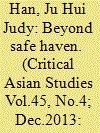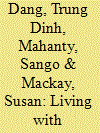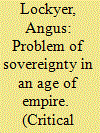|
|
|
Sort Order |
|
|
|
Items / Page
|
|
|
|
|
|
|
| Srl | Item |
| 1 |
ID:
125162


|
|
|
|
|
| Publication |
2013.
|
| Summary/Abstract |
From providing the basic needs of food, clothing, and shelter to facilitating travel for those seeking refuge, decentralized underground Christian networks in China have assisted countless undocumented North Korean migrants in situations both dire and desperate. However, with no systems for transparency or accountability in place, and with conservative religious agendas structuring spaces of aid and advocacy, these networks also produce troubling paradigms of custodial confinement and discipline. Drawing on field research in the United States, South Korea, and China, this article examines the way a Christian missionary safe house in China illustrates a political theology of custody through its employment of care and control as well as its attention to and detention of vulnerable populations. The author shows that missionaries justify their custodial authority by stressing good intentions and a pastoral prerogative, but deny the unequal power relations that undergird the very structure of their missionary activities for undocumented North Korean migrants.
|
|
|
|
|
|
|
|
|
|
|
|
|
|
|
|
| 2 |
ID:
125204


|
|
|
|
|
| Publication |
2013.
|
| Summary/Abstract |
Vietnam's rural provinces are home to thousands of craft villages; communities engaged in small- and medium-scale manufacturing of a range of goods, from recycled paper products to processed food. Since the liberalization of the Vietnamese economy in 1986, craft villages have played a significant role in poverty reduction and livelihood diversification for rural households, and currently employ nearly one-third of Vietnam's rural labor force. However, the rapid expansion of craft manufacturing, combined with a lack of planning, has brought increased air, soil, and water pollution to craft villages and surrounding areas. Pollution levels are now so serious that they pose a major risk to local health and agriculture. This article examines why producers continue to expose themselves to environmental pollution and its associated health risks. Drawing on four case studies of craft villages in the Red River Delta region of northern Vietnam, the authors find that risk is a multidimensional phenomenon. Craft production typically involves a value chain of closely connected family economic units and takes place against a backdrop of fierce competition for market share both within Vietnam and elsewhere in Asia. In this context, the current policy of managing the environmental risks of pollution through regulation requires producers to take risks in other domains of equal or greater importance to them; their livelihoods and social relations. Craft producers make explicit trade-offs between the risks of ill health and the security that family and community ties provide in the face of uncertain production space, markets, and livelihoods. These findings highlight the importance of thinking
|
|
|
|
|
|
|
|
|
|
|
|
|
|
|
|
| 3 |
ID:
125166


|
|
|
|
|
| Publication |
2013.
|
| Summary/Abstract |
Turning on the logic of the spectacle, U.S.-based campaigns on North Korean human rights, in calling for intervention, have wielded two images aimed at outing North Korea's "hidden truths"? the image of the starving child circa the 1990s and the contemporary satellite image of what appear to be labor camps. Focusing on the use of online virtual geo-imagery programs like Google Earth in the human rights mapping of North Korea, this essay situates post-9/11 "liberation technology" within the framework of the unending Korean War, a war whose failed "liberation" of Korea from the global forces of communism haunts North Korean human rights critique today. By examining mid-century bomber photographs and contemporary human rights satellite images of North Korea, this essay inquires into the homology between technologies of militarized intelligence and war, on the one hand, and technologies of human rights that aim to expose North Korea, on the other. Both modes of apperception, this essay argues, strive to delegitimize and destroy rather than faithfully represent the enemy.
|
|
|
|
|
|
|
|
|
|
|
|
|
|
|
|
| 4 |
ID:
125186


|
|
|
|
|
| Publication |
2013.
|
| Summary/Abstract |
The "right-to-health" framework asserts that everyone has the right to the "highest attainable standard of health." In this article, the authors explore how the right-to-health framework can aid our understanding of the state of health in North Korea today. In recent reports, human rights organizations have accused the North Korean state of violating its people's right to health. Critical examination of these reports, however, reveals a myopic focus on the North Korean state and a limited consideration of the relevant political and historical context in which the right to health ofNorth Koreans may be violated. Furthermore, by selectively applying the right-to-health framework to the public health situation in North Korea, while ignoring other low-income countries with similar health problems, the human rights reports politicize humanitarian conditions and use public health problems to justify hostile policies toward North Korea. To help improve health and welfare in North Korea, the right-to-health framework should be applied with greater consideration of the geopolitical context and take actors other than the North Korean government into consideration. Analyses based on the right-to-health framework should also incorporate studies done by the broader movement for peace and justice in the Korean peninsula and be developed in consultation with peace and justice organizations.
|
|
|
|
|
|
|
|
|
|
|
|
|
|
|
|
| 5 |
ID:
125222


|
|
|
|
|
| Publication |
2013.
|
| Summary/Abstract |
ABSTRACT: This article examines a confrontation at the Exposition Universelle in Paris in 1867 between the Tokugawa shogunate and the domain of Satsuma. The confrontation was provoked by the latter, which used its control over the Ryukyu Islands, the services of a minor Franco-Belgian nobleman, and the opportunity of the international exhibition to demonstrate its independence from and equality to the shogunate. The episode was incidental to the collapse of the Tokugawa state later that year, but is a useful microcosm through which to understand the relationship between domestic considerations and international relations in the constitution of the modern state. Most accounts of modern Japan tend to be premised on the normative status of the latter, both as a natural container within which the early modern elements of the archipelago could be alchemized and as a soon-to-be sovereign actor on the international stage. This article argues, however, that this assumption is problematic. By the 1860s the order was clearly inadequate to the demands of the international system. The Meiji state, however, remained vulnerable to these, in ways the events in Paris suggest. The shogunate's difficulties underline the effort necessary to create the appearance of sovereignty, but also the extent to which its assertion and recognition is subject less to professed norms of equality and independence than the consequences of interest, industry, and empire. As such, it becomes clear that sovereignty can disrupt as much as it can clarify, undermining the order it seems to promise.
|
|
|
|
|
|
|
|
|
|
|
|
|
|
|
|
| 6 |
ID:
125161


|
|
|
|
|
| Publication |
2013.
|
| Summary/Abstract |
Introducing the core concerns animating this two-part thematic issue of Critical Asian Studies (December 2013 and March 2014), this essay offers a historicized overview of the consolidation of contemporary human rights as the dominant lingua franca for social justice projects today. Highlighting what the rights framework renders legible as well as what it consigns to unintelligibility, this essay examines the antinomies of contemporary human rights as an ethico-political discourse that strives to reassert the dominance of the global North over the global South. Relentlessly presentist in its assignment of blame and politically harnessed to a regime-change agenda, the human rights framing of North Korea has enabled human rights advocates, typically "beneficiaries of past injustice," to assume a moralizing, implicitly violent posture toward a "regime" commonsensically understood to be "evil." Cordoning off North Korea's alleged crimes for discrete consideration while turning a willfully blind eye to the violence of sanctions, "humanitarian" intervention, and the withholding of humanitarian and developmental aid, the North Korean human rights project has allowed a spectrum of political actors-U.S. soft-power institutions, thinly renovated cold war defense organizations, hawks of both neoconservative and liberal varieties, conservative evangelicals, anticommunist Koreans in South Korea and the diaspora, and North Korean defectors-to join together in common cause. This thematic issue, by contrast, enables a range of critical perspectives-from U.S.- and South Korea-based scholars, policy analysts, and social justice advocates-to attend to what has hovered outside or been marginalized within the dominant human rights framing of North Korea as a narrowly inculpatory, normative structure.
|
|
|
|
|
|
|
|
|
|
|
|
|
|
|
|
|
|
|
|
|